Power to be: How lack of electricity affects everything – and what you can do about it
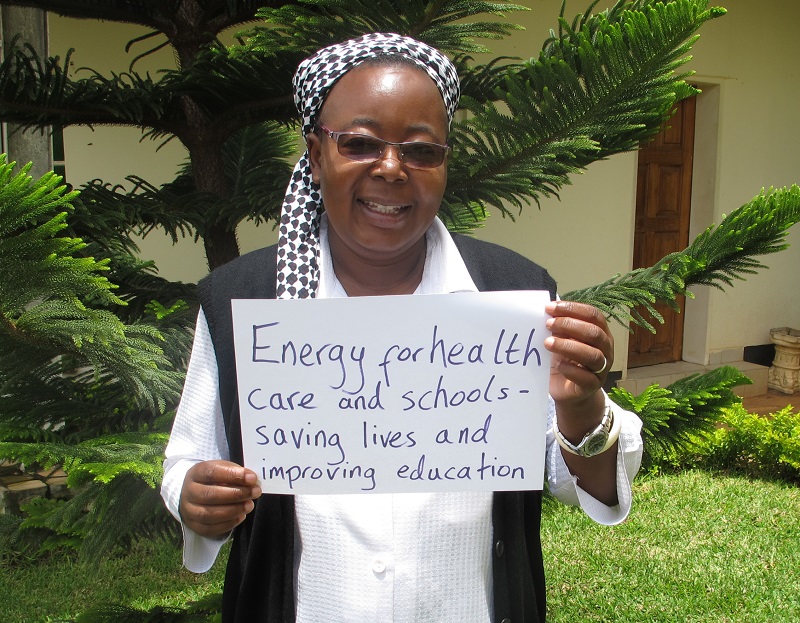
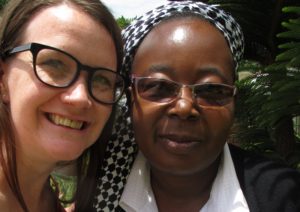
Hannah Mottram works in CAFOD’s policy team. She reports from Zambia, where access to electricity can transform lives.
“The work that I do is not just work,” says Sr Mathilde Mubanga, trained nurse and national health co-ordinator for the Zambian Bishops conference. “It is a service to the people of God, so I make sure that I do the very best that I can. I am not just there to give an injection, but to embrace patients as people, as fellow human beings.”
Sr Mathilde has been in her current role for nine years: travelling across Zambia to train staff, inspect health facilities and liaise with the national department of health.
She knows first-hand about the many challenges faced by health services in developing countries. When we met in Zambia recently, we discussed one challenge which is sometimes overlooked: lack of access to electricity.
Sign our Power to be petition, calling for more support for local, renewable energy
Would you deliver a baby by candlelight?
“When health facilities don’t have power, they can’t pump water for patients or use life-saving equipment,” she explains. “Women can go into labour at any time. So at night, light is needed for delivery. Can you imagine delivering a child using a candle at night? Emergencies cannot be attended to if there is no power. This can cost lives.
“Lack of pumped water leads to outbreaks of cholera or dysentery. It makes disease control very difficult. If we had solar power in more rural communities, life would be much better.”
It’s not just patients who can benefit from access to safe, reliable and affordable electricity, it’s the staff who care for them too.
“Energy access for health facilities helps the morale of healthcare professionals, as then they are able to help as well as they can,” insists Sr Mathilde. “Often they can’t help because they do not have access to energy, even though they have the skills.”
Lack of electricity affects everything
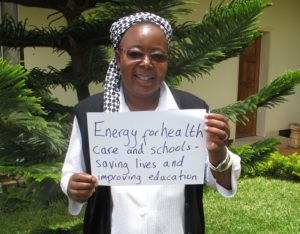
Rural areas without access to electricity can find it hard to attract good teachers, as well as medical staff. It affects everything, from lack of light for school students to do their homework, to equipment available in schools.
Lack of access to clean energy for cooking also has negative impacts on women’s and children’s health and means they spend time collecting firewood rather than doing schoolwork or other activities.
Access to electricity can transform whole communities: powering homes, schools, clinics, irrigation systems and water purifiers. Safe, reliable, affordable and renewable energy is a major factor in more children living to see their fifth birthday, improved school attendance, and more people being able to read and write.
Sign our Power to be petition, calling for more support for local, renewable energy
The Church is ‘a voice for the poor’
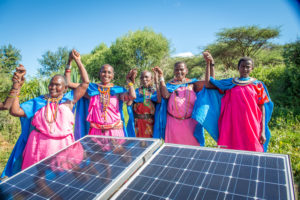
The links between access to energy and poverty, as well as the potential for electricity to transform lives, are clear. Sr Mathilde, as one of CAFOD’s advocacy partners, is committed to sharing ideas and speaking out about how to bring electricity to the poorest communities in the most effective way.
“The role of the Church in Zambia is advocacy: to be a voice for the poor,” she continues. “People do not even know their rights. It is our work to show them what they are due – clean water, better education, better health services, which are all related to energy.”
Most people in energy poverty live in rural, sparsely populated areas. This means that connecting them to the electricity grid, however it is powered, would be expensive.
Instead, local, renewable energy is usually the cheapest, fastest and most efficient solution. Solar panels and small-scale wind turbines can provide safe, affordable and reliable energy without harming the earth we share.
At CAFOD, we will continue to support Sr Mathilde and other overseas partners, helping them advocate for the energy that their communities need to flourish.
But there’s something we can all do, here in England and Wales: we can also lend our voices to their cause.
Join the Power to be campaign
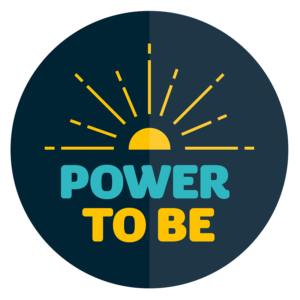 CAFOD’s new Power to be campaign, calling on the World Bank to support local, renewable energy to tackle poverty. We are confident that Catholics in England and Wales will add their voices in solidarity, as they have before on issues like debt, Fairtrade and climate change.
CAFOD’s new Power to be campaign, calling on the World Bank to support local, renewable energy to tackle poverty. We are confident that Catholics in England and Wales will add their voices in solidarity, as they have before on issues like debt, Fairtrade and climate change.
Find out more about the Power to be campaign
The UK already spends aid money on energy access for the poorest communities through the World Bank. This is supposed to help tackle poverty, but there is a problem: currently only a tiny proportion of World Bank spending supports the kind of energy that we know can empower the poorest communities. To enable communities to flourish, this has to change.
That’s why we’re asking the UK to use its influence at the World Bank to shift the balance and support local, renewable energy that can lift people out of poverty.
Sign our Power to be petition, calling for more support for local, renewable energy